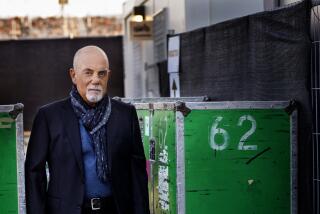MANILOW RETURNS TO THE SCENE OF THE CLIMB
- Share via
You can go home again.
Barry Manilow, after one commercially disappointing album for RCA Records, is returning to Arista Records, where he amassed a string of Top 10 hits in the ‘70s and early ‘80s, including “Mandy” and “I Write the Songs.”
Leaving Arista two years ago, Manilow stated that he wanted more artistic control over his music. Rough translation: He wanted a break from the pressure of working with Arista President Clive Davis, who prides himself on personally supervising the recording career of his artists.
Now, Manilow, 41, suggests that a little pressure isn’t such a bad thing after all.
“You never miss the water till the well runs dry,” the singer said during a break last week from shooting an upcoming CBS-TV special. “Bette Midler told me that after I had left her as musical director, and I feel the same way about Clive.
“I missed his guidance. I realized I needed that kind of input. I needed a bouncing wall; somebody from the record company to give me an opinion. I had none of that at RCA. They were going through internal changes at the time, and the people who signed me weren’t there when I got there. I really felt a little at sea for a while.”
RCA executives have declined comment.
Manilow is one of several stars in recent years who have returned to their original record companies after becoming disenchanted with new labels. Elton John returned to MCA Records--the home of his big ‘70s hits--earlier this year after a less productive six-year stint with Geffen Records. Paul McCartney re-signed with Capitol in 1985 after six uneven years with Columbia.
What is significant is that Manilow is moving back after just one album.
The move was doubly surprising because Davis has been widely quoted about the difficulty of getting air play for white ballad singers like Manilow.
In an interview by phone from Arista’s New York headquarters, Davis said one reason he’s looking forward to the reunion with Manilow is to “challenge” Top 40 radio’s resistance to white ballad singers.
“It will be a challenge to try to come up with those special songs to see if we can break this monopoly,” said Davis. “Barry defined the ballad in the ‘70s and early ‘80s, and if anybody can do it, I think he can. We are both realistic, knowing that it’s against the current pop trend.”
About his earlier decision to leave Arista, Manilow said, “I just felt like I was ready to give it a try on my own. Clive and Arista had literally given me life in the music industry. I needed some space. I needed to separate. I wanted to see what the world was like out there.”
The world turned out to be a pretty cold place for Manilow. His RCA album, “Manilow,” peaked at No. 42 on Billboard magazine’s national sales chart, making it the lowest-charting album of his career. It was also his first album not to go gold (500,000 sales). By contrast, Manilow had seven consecutive Top 10 albums in the ‘70s.
Manilow suggested that his relationship with Davis has improved because of the separation.
“I think that both of us respect each other a little more,” he said. “I’m not sure either of us really realized how well we worked together until we got away from it. It’s a lot like a family: You get a little too used to each other and you can’t see each other’s strengths.”
While Manilow has been struggling on the charts in recent years, Arista has enjoyed giant hits with such artists as Whitney Houston, Billy Ocean, the Grateful Dead and Kenny G, giving the label “more flexibility,” according to Davis.
“I can go into black music or rock or jazz-fusion, whereas he’s caught in the CHR (contemporary hit radio) antipathy to white pop artists. It’s not like I’ve been able to create a new Barry Manilow.”
Houston’s “Didn’t We Almost Have It All,” the No. 1 single for the past two weeks, is very much in the big ballad mold of such old Manilow hits as “Looks Like We Made It” and “Tryin’ to Get the Feeling Again.”
Questioned about Houston’s success, Manilow responded, “But if I did that song, I don’t think I could have a hit record on it right now.”
Manilow and Davis said they think they’ve found a solution to the radio freeze-out. They’re looking for ballads, but not big, crashing ones like the ‘70s hits. Instead, they’re looking for more subtle, fluid songs--like Manilow’s 1982 hit “Somewhere Down the Road.”
“They still have heartfelt lyrics and a lot of them have sweeping melodies like the old hits, but they’re just a little off-center,” Manilow said. “They don’t follow the formula.
“I think that all of us are a little nervous about that big hook that smashes into the chorus that keeps repeating. Frankly I think that maybe we all overdid it for a while--all us white-guy singers with the crashing, booming ballads.”
Manilow’s first pop album for Arista will be issued in early 1988, but the label will first release the sound track to his CBS-TV special “Big Fun on Swing Street!” scheduled to air in November or January. Like Manilow’s acclaimed 1984 album, “2:00 AM Paradise Cafe,” the “Swing Street” sound track consists of pop/jazz songs with a ‘40s sensibility.
But instead of featuring only smoky ballads, “Swing Street” will have one side of uptempo songs. The sound track--featuring guest performers Kid Creole, Gerry Mulligan, Stan Getz, Phyllis Hyman and Diane Schuur--is due Nov. 12.
Manilow’s first book, the autobiographical “Sweet Life: Adventures on the Way to Paradise,” is due Oct. 12 through McGraw Hill.
More to Read
The biggest entertainment stories
Get our big stories about Hollywood, film, television, music, arts, culture and more right in your inbox as soon as they publish.
You may occasionally receive promotional content from the Los Angeles Times.










